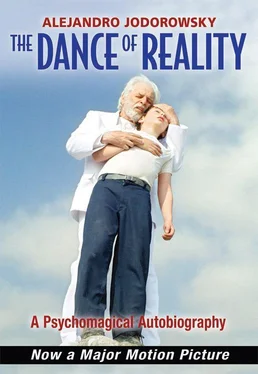The workshops were coming to a close. A student confessed to having spied on me one morning, and requested a massage. I agreed. I asked her to undress, to lie on a table. I started to massage her without anything in mind. My hands moved by themselves. Accustomed to the apparent insensibility and hardness of the stone, they felt not only the skin and flesh but also the viscera and bones. This body appeared to me to be divided by horizontal barriers, and I dedicated myself to establishing vertical connections from head to toe. The next day, my student gathered up her savings and set off on a trip around the world.
In the series of dreams in which the central character, the self, gives more importance to the realization of others than to its own realization, there was one dream that marked me deeply and that may have been the result of my experience massaging the rock:
I am sitting, meditating before the gates of a temple. I know that they will not let me into the temple because I am carrying a huge bag with me, seemingly full of garbage. I believe that this bag is part of me and that therefore I have the right to attend the ceremonies that are performed inside the temple accompanied by my burden. A group of men and women approach, each one sadly carrying a bag similar to mine. I rise, full of joy, and say, “If you have to see it to believe it, then take a look!” I open my bag and empty it out. A thick stream of black ink flows out of it, forming a puddle at my feet. The poor people follow my example and begin to empty out their bags, which are also full of thick black ink. We have created a dark lagoon.
I remove a thin column from the facade of the temple with which I stir this goo. As the stone rod rotates, long stems emerge from the pool, rising up many meters. Enormous sunflowers open up at their ends. These flowers attract light, and soon the place is pervaded by a golden glow. The towers on the temple also open like flowers. The people’s joy is so intense that it infects me. I awake in a state of joyous excitement. Sunlight comes pouring in through the window of my bedroom.
In the Bible it is said in Exodus that Moses found a bitter pool while leading his thirsty people through the desert. God indicated a bush to him. Moses stirred the water with the bush, and it became sweet. Thus he slaked the thirst of two or three million throats (Exodus 15:22–25).
When Moses did not reject the bitter water, that is to say, did not reject the apparent nightmare and took action using the branches above him, making the plant into an extension of himself, the water was converted into his sweet ally. The conscious, when it recognizes the subconscious and surrenders to it with love, leads the subconscious to reveal itself with all its positivity. (This is the opposite of what was described by Robert Louis Stevenson in The Strange Case of Dr. Jekyll and Mr. Hyde .) In the world of lucid dreams we begin by acting, giving, creating. Then we have to learn to receive. Accepting the favor that the other person or thing can perform for us is a form of generosity. Knowing how to give must be accompanied by knowing how to receive. All the characters and objects in our dreams have something to offer us. All the beings that we see in real life, animate or inanimate, can teach us something. For this reason, little by little I set aside voluntary acts and obeyed the will of the dream more and more. At last, I felt very comfortable being what I was in this dream world: a serene old man, surrendering to events, knowing that by virtue of their manifestation, they are a celebration. The following are some happy dreams. I used to write them down. Today I no longer do. That which has a natural tendency to fade should be allowed to do so.
I am exploring the slopes of a mysterious mountain without any concern for the legend of it being inhabited by ferocious golden warriors. In an ice cave I discover a hot spring. I plunge my hands into the water, knowing that after healing all my diseases it will give me the power to cure the ills of others.

I am a child. I go into a school run by a family of fat people. The gym teacher is an elephant. During the exercises I become very fond of the animal. I grow two extra arms from my shoulders. I receive a diploma giving me the title of Rising Demon.
A Mandarin Chinese man lies comatose. A group of elderly priests apply a hot iron to his side to see if the pain makes him react. “You’re wasting your time,” I say. “He’s definitely dead.” The old men stop burning him, and the cadaver looks at me. Puzzled, I wonder, “What am I doing here in China? Who am I?” The dead man answers, “You are me. Worship the one who burns you!”
I have gone up a very high mountain in search of my dead son. I arrive in a valley by automobile. The snow has covered all the roads, but I drive with enthusiasm, despite the danger of falling off a precipice, because I am taking Teo to a huge party. He laughs. We enter a city. On the streets there are carnival parades, led by his brothers.
When we achieve the role of the lucid witness, when we submit our will to that of the dream world, when we realize that we are not ourselves dreaming, nor the person who is asleep, nor the person who is awake in the dream, but the collective self, the cosmic being, who uses us as a channel to make human consciousness evolve, then the barrier between waking and sleep, if it does not disappear, will at least be transparent. We realize that in the shadow of the rational world, the mysterious laws of the dream world thrive.
I suggest that my clients treat reality as a dream, initially as a personal and nonlucid dream, in order to analyze the events as if they were symbols of the subconscious. For example, instead of lamenting because thieves have ransacked the house or because a lover has left, I suggest that they ask, “Why have I dreamed that I was robbed or that I was deserted? What am I trying to say with this?” During my interviews I realized that events tend to arrange themselves, seemingly “by chance,” into series in the dream that correspond to the metamorphosis of a single message. It is common for people to suffer from a breakup with a partner, lose money, or be robbed. In other cases, people who are caught up in conflicts that give rise to irrational anger may dream that they are suddenly in the middle of a hurricane, an earthquake, or a flood.
One client’s mother, with whom he had had a love/hate relationship, had just committed suicide. After the cremation ceremony, his apartment caught fire. In this type of chain of events, reality presents itself to us as a dream inhabited by distressing shadows in which we are victims, passive beings to whom things happen. If we stop identifying with the individual self through conscious effort, if we are able to “let go” and become impassive witnesses to what seems to happen to us by accident, and even more, if we stop suffering from what happens to us and begin to suffer from suffering from what happens to us, then we can get past the stage that corresponds to the lucid dream and introduce unexpected events into reality that cause it to evolve. The past is not immovable; it is possible to change it, enrich it, strip it of trouble, give it joy. It is evident that memory has the same quality as dreams. The memory consists of images as immaterial as dreams. Whenever we remember we recreate, giving a different interpretation to the events remembered. The facts can be analyzed from multiple points of view. The meaning of something in a child’s consciousness changes when we pass on to the adult level of consciousness. In memory, as in dreams, we can amalgamate different images. I spent three months during a harsh winter stuck in a hotel room in Montreal, Canada, waiting for a visa to enter the United States as an assistant to Marceau. The room was gray and depressing, the bed narrow and hard, the sink constantly emitted grunts like a pig, and the window invaded by arrows of neon light from a nearby pizzeria. Not wanting to remember those months as a time of such painful loneliness, in my mind I started painting the walls of the room in brilliant colors. I gave it a large bed with silk sheets and feather pillows, converted the grunts of the sink into gentle trumpet notes, and replaced the arrows in the window depicting a bleeding pizza with a blue lunar landscape in which luminous entities danced. I changed my nasty room into an enchanted place, as if retouching a bad photograph. Eventually, the real room was forever joined to the imaginary room. Then I started to dig up other unpleasant recollections in order to add details to brighten them. I turned egotists into generous teachers, deserts into lush forests, failures into triumphs.
Читать дальше













